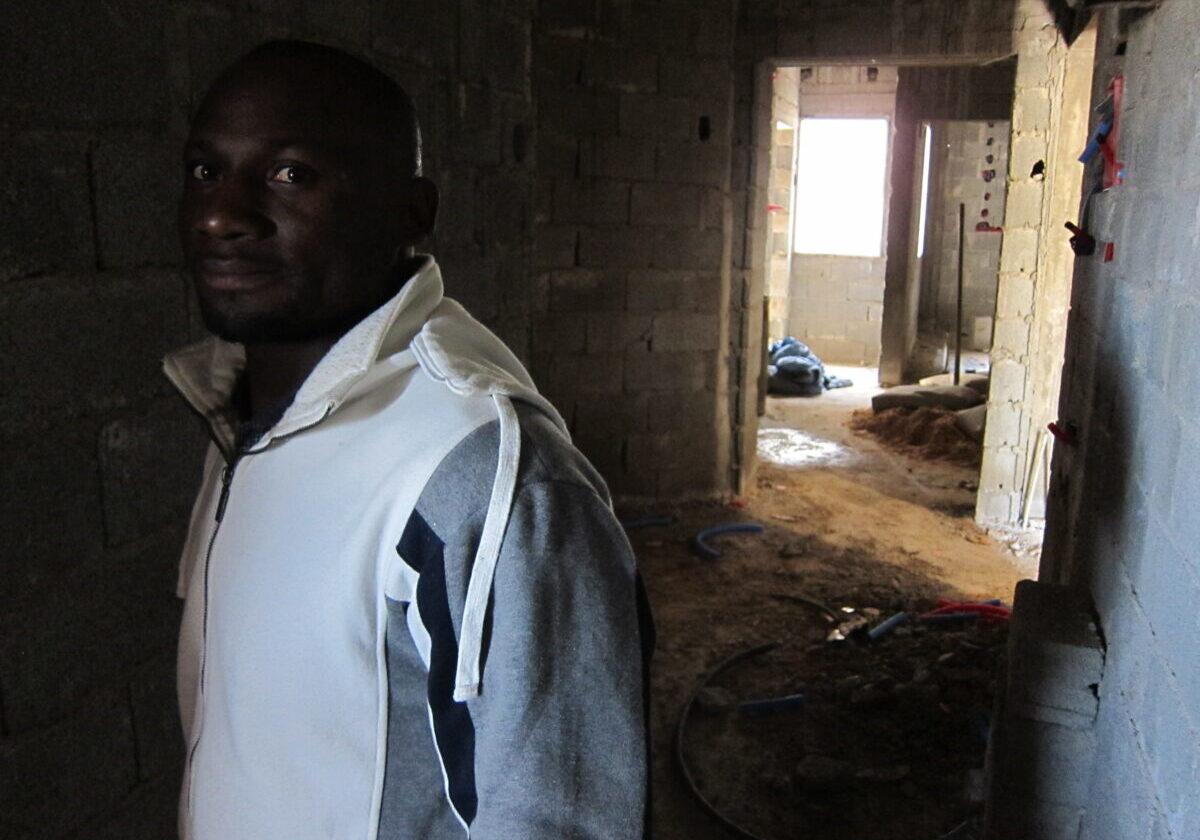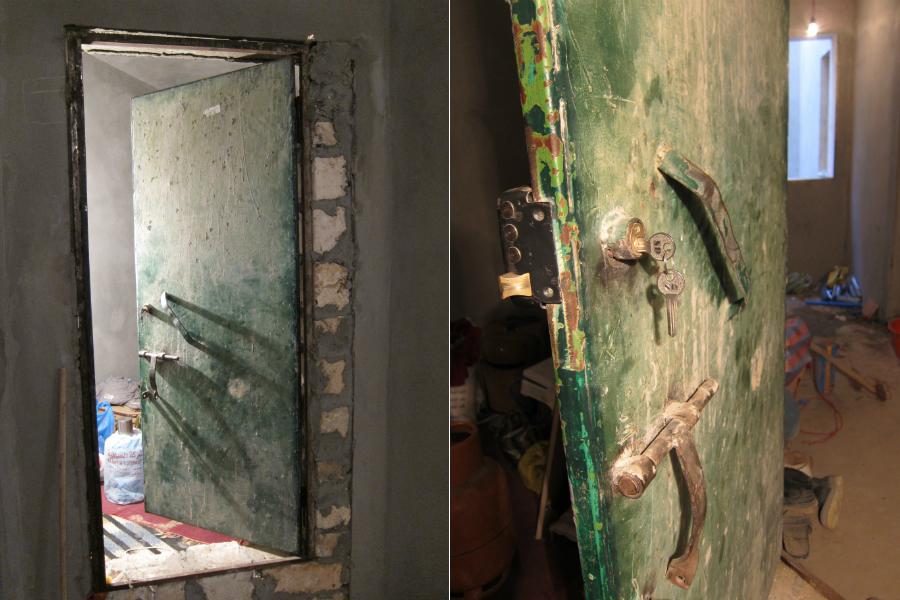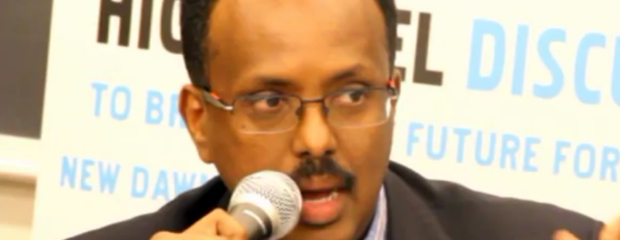“Here we have no life”: The migrant workers persevering in Libya

Despite the risks, the plan for Ghanaian workers in Libya is straightforward. Survive, earn, return.

Kaye, one of thousands of Ghanaian migrants in Libya. Credit: Hans Lucht.
Before Kaye and his crew of Ghanaian migrant workers agreed to take a job plastering a building in a southern Tripoli suburb, they had one essential request. That the owner build them a safe room. In Libya, armed gangs are known to prey on African workers and safety is a key concern.
“Here, even the small boys have knives, and with the knives sometimes they also have a gun,” says Kaye. “One of our friends was shot in both legs in the street just over there. He’s back in Ghana now.”
That’s why Kaye insisted their contractor install a solid green iron door to a bare room on the third floor where the team could sleep and seek refuge when needed. This provides some additional security, but little comfort. “We never really get a deep sleep”, says Kaye. “Every time there is a little sound outside, I sit straight up and tell the others to get up also. We can never relax here.”
This stress combined with the lack of personal space often leads to tensions. Kaye, as leader of the four-person crew, takes it upon himself to settle disputes quickly. “I have to call them and explain that we’re not in Senya Beraku [in Central Ghana]. We are not free to do what we want to do so we have to be careful. We are in this together.”
Kaye is one of the 666,717 migrants currently estimated to be in Libya. 65% are from sub-Saharan Africa and around 10% from Ghana. Interestingly, in 16 out 24 Libya’s municipalities, migrants state that Libya is their main destination, stressing the importance of the country as a labour market and not only a stepping stone to Europe.
Kaye’s reason for coming to Libya was simple. Buckle down in the volatile country long enough to make enough money to build a house back home. He earns about 1,500 dinar a month here, which is about $375 at the current black-market exchange rate. According to Kaye, that’s about triple what he would get for equivalent work in Ghana’s informal sector. His plan is gradually making progress.
“I have enough money to get the blocks and the roofing slates and I already have bought a piece of land at home so, God willing, I will go home and put that house up,” he says.
“Every day is like this”
At Kaye’s workplace, a three-story apartment complex at the end of a bumpy dirt road, a typical division of labour is in place. The Ghanaians do the plastering, Moroccans the stucco, Egyptians the electricity.
Kaye and his crew, however, are the only ones that live in the unfinished building. They sleep in the safe room and dry fish and clothes on the roof from which they can gaze across the capital. They overlook the nearby compound of the Dawa Islamiya (or Islamic Call Centre) alongside low houses with walled gardens, iron gates and a local mosque.
The group’s day begins at 5am with prayer. Kaye, a devout Pentecostal, leads it as he did every day on their dangerous desert journey. But, he explains, they now do it very quietly since the Libyans “don’t allow it”. They then work until 8am before stopping for breakfast, usually consisting of tea and flat bread. They continue work until 5pm when they eat and pray again. The evenings are spent talking and relaxing before they lock themselves behind the green iron gate and crawl into their sleeping bags hoping for a quiet night.
“Every day is like this,” says Kaye. This wasn’t always the case. Security has deteriorated since the 2011 uprising and worsened even further since General Khalifa Haftar’s assault on Tripoli in April 2019.
“We can’t go outside anymore,” continues Kaye. “Before the war we could go to the old town on Fridays and do window-shopping. Now we don’t even have a television. We don’t know what’s going on in the outside world. We live like in a prison here.”
The fighting is currently at a stalemate with Haftar’s forces entrenched outside Tripoli. Recent UN reports indicate that the migrant labour work force is largely staying put though they constitute a “particularly vulnerable group”, given their lack of access to transportation and safe locations. Along with tens of thousands of Libyan civilians, they have been affected by the clashes and airstrikes as well as price hikes and rising insecurity. How long they can hold up is an open question. If the siege of Tripoli drags on and work and salaries dry up, Libya’s large migrant population will be in urgent need of international attention and protection.
At the same time, however, Libya remains a financially attractive in risky labour market and destination for African migrant workers. Since the beginning of the year, the Libyan Dinar has gained strength over the dollar and it would not be a big surprise to see migrants continue to enter the country through the desert even as others are flown out from detention camps by the UN.

The following Friday, Kaye and his brother Horatio are preparing banku and fish on the roof. Afterwards, they go to a nearby house to visit another group of seven young migrants from Senya Beraku who are also plastering an apartment building. It’s a cold morning and the team are spending their day off in sleeping bags, fully dressed, watching a Nigerian movie.
They say they had an attempted break-in earlier that morning, but the intruders couldn’t get through the door to their safe room. They point out that there’s an opening above the door from which somebody could spray the room with bullets. Whenever criminals try to enter, they explain, they run and squeeze up against the wall for safety.
“They can come anytime,” one of the migrants called Robert says. “Libya has become too dangerous and too unpredictable. There’s no law and no justice, especially for Africans”.
On top of this uncertainty, the men say that their time in Libya is undercut by a constant longing for family back home in Ghana.
“I miss my wife and my children. I love to play with them,” says Kaye. “They always have a small question for me – ‘father, the teacher said this in school, what does it mean?’ – and we try to solve it together. And then we practice reading the Bible. Here we have no life.”
For Kaye and others, however, working in Libya is a means to an end. An economic necessity, albeit one that is getting ever more precarious amid the ongoing conflict.
“Before people stayed longer but because it’s so dangerous now we can only stay one year, maybe a little more,” says Kaye. “When you reach home you give thanks to God that you made it.”
Since the research for this piece was conducted – before and after Kaye’s stay in Tripoli in 2014–2015 – three of crew, including Kaye, have returned to Ghana. The fourth died tragically in the Mediterranean Sea trying to reach Europe. With the profits from Libya, Kaye and his wife have opened a grocery store in his home town in Central Region and he is currently constructing a house for his wife and two children.






I am a Ghanaian but l have absolutely no sympathy for people like ‘Kaye’ or any other Africans for that matter, who think the grass is always greener everywhere else except their own societies. There are people here in Ghana who are poorer than ‘Kaye’ but who haven’t embarked on a dangerous journey to ‘make it’ in some strange place they know nothing about. ‘Kaye’ thought he would become rich overnight doing jobs he wouldn’t do in his home country. It was his choice. They must bear the consequences of their choices. If ‘Kaye’ is lucky to return home hopefully he’d paint a true picture of his horrible experiences on such reckless journeys so that others can learn from him. Thank you for bringing his story to all of us though.